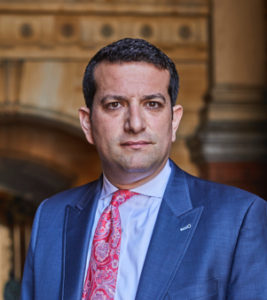Brain Injury From A Motorcycle Accident
A motorcycle rider is vulnerable to their surroundings at all times. Unlike the occupant of a motor vehicle, motorcyclists have no significant barriers or protection from their environment. Motorcyclists rely on personal safety protection such as helmets and thick riding gear to reduce the severity of any injuries that may occur.
Unfortunately, riders are at high risk for brain injuries in a motorcycle accident. The brain injuries suffered by a motorcycle rider range in severity. Some motorcycle accident victims will lose their lives due to their injuries, and others will survive but face significant effects on their life after a brain injury. Brain injuries are complex, and many factors influence the extent of the injury and the potential long-term effects. Learn more about risks, symptoms, long term complications about motorcycle accidents below. If you have questions about your injuries and filing a claim then speak with an experienced motorcycle accident lawyer today to discuss your recovery options.
Traumatic Brain Injuries and Motorcycle Accidents
Nearly 5,000 motorcyclists lose their lives each year due to an accident. Motorcycle accidents may not be as common as car accidents, but the effects are often catastrophic. Brain injuries can affect over 17 percent of patients who require hospital admission for their injuries. The severity of a brain injury affects the victim’s likelihood of survival, the costs of the injuries, and a victim’s recovery and long-term care needs.
Motorcycle helmets offer protection to motorcyclists to prevent brain injuries; they lessen the impact and severity of an injury to the head. While Traumatic Brain Injuries (TBIs) happen to riders wearing their helmets, helmets may mean the difference between a fatal injury and a survivable injury.
The Impact of an Accident on a Motorcyclist’s Brain
The events leading up to a motorcycle crash happen in seconds. A motorcyclist often has little to no time to react or avoid a crash. The motorcycle rider is vulnerable when a vehicle barrels at them.
It takes very little external force to cause a rider to lose control of their bike or get thrown off the motorcycle. In motorcycle accidents, a rider is not just at high risk of injury but is particularly susceptible to head and brain injuries.
Primary Impact
At the moment of impact, the motorcycle rider is hit with an enormous force. This initial hit is strong enough to cause serious injury to the motorcyclist, and brain injuries can occur from the sudden snapping of a motorcyclist’s head and neck in any direction. These brain injuries can happen to all riders, including those wearing their helmets and those that avoid striking their head directly against other objects.
The Momentum of the Crash
One of the most devastating aspects of a motorcycle crash is the aftermath. The force behind the impact often throws the motorcycle rider against the ground, nearby objects, other oncoming vehicles, or a vehicle’s windshield. The crash’s momentum gives the rider little ability to control their body and avoid subsequent impacts.
The secondary effects can wreak havoc on the body and cause the most severe traumatic brain injuries. Riders without helmets whose head directly strikes other objects or the pavement often suffer fatal injuries. Those with helmets may ultimately survive the accident but still face severe injuries.
Penetrating Injuries
Motorcyclists, especially riders not wearing helmets, are prone to penetrating head injuries during an accident. A penetrating head injury is when the skull fractures during an accident. This injury is severe and has the highest risk of death or permanent disability.
Complications During Recovery
A motorcyclist that survives a motorcycle accident but suffers a head injury is in a precarious state following the collision. Surviving the accident and its impact is a crucial hurdle. Still, many traumatic brain injury complications and life-threatening risks may lead to further damage or death.
The Different Types of Traumatic Brain Injuries
The term traumatic brain injury refers not to one specific injury to the brain but a multitude of injuries ranging in type and severity that can affect an individual’s brain.
Any injury to the head can develop into a traumatic brain injury. While very forceful and devastating motorcycle accidents are likely to cause TBI, any accident, regardless of severity, can cause TBI.
Traumatic brain injuries break down into two categories: closed or open. Closed head injuries are those where there is no fracture of the skull or penetration by an object or debris. Open head injuries are those where the skull breaks or fractures or there is some form of intrusion entering the brain through the skull.
Examples of common motorcycle accident traumatic brain injuries include:
- Hematomas
- Concussions
- Skull fractures
- Diffuse axonal injury
- Contusions
- Edema
- Hypoxia
- Ischemia
- Hydrocephalus
What Are Warning Signs or Symptoms of a Traumatic Brain Injury After a Motorcycle Accident?

Every motorcycle accident victim should undergo an evaluation in an emergency room following a collision. While those with severe and visible injuries immediately go to an emergency room or trauma center by ambulance, those unsure about their injuries should also go to the hospital for medical evaluation.
Traumatic brain injuries develop and worsen over time. If an injury is obvious at the scene, it is likely life-threatening and may require intensive intervention. Without an apparent injury, a victim may not know if they have injuries or may even think they are okay. However, if there is a traumatic brain injury, a victim's condition will worsen as the injury progresses.
Signs and symptoms of TBI following a motorcycle crash include:
- Constant headache or one that worsens over time
- Nausea and/or vomiting
- Difficulty with concentration
- Slurred speech or blurred vision
- Fluid leaking from the nose or ears
- Seizures
- Lethargy
- Feelings of confusion or haze
Can You Heal from a Traumatic Brain Injury That Occurs in a Motorcycle Crash?
The most significant losses to motorcycle accident victims are from the loss of productivity throughout their lives. Many motorcycle victims with brain injuries will never fully recover to their condition before the crash. While some victims of the most severe motorcycle accident injuries suffer extreme consequences and impediments, leaving them permanently incapable of caring for themselves, other survivors may suffer less severe but often frustrating injuries.
Whether a traumatic brain injury will heal is difficult to predict and is often an impossible question for doctors to answer. The only thing that can potentially heal a traumatic brain injury is time. While many victims make great strides and significant improvements to their quality of life through medical interventions and therapy, others will never be the same after a motorcycle accident that causes TBI.
Can You Sue for a Traumatic Brain Injury in a Motorcycle Collision?
Traumatic brain injuries are some of the costliest and most severe injuries a victim can suffer after a motorcycle accident. However, insurance companies will try to undercut the severity of a victim’s TBI to cut costs and save money for their bottom line.
Proving a traumatic brain injury and the corresponding lifelong effects as part of an insurance claim or lawsuit is difficult. A motorcycle accident plaintiff must not only prove the existence and extent of their brain injury but must also detail the injury’s effect on their life now and into the future to demand the maximum damages possible.
In most cases, the first attempt at resolution of your motorcycle accident case will be through an insurance claim. Many victims can reach a successful resolution of their brain injury case through a settlement with the insurance company with the help of their attorney.
However, in the most severe brain injury cases, you may need to sue the insurer and/or the party responsible for your injuries. The higher the costs of a brain injury, the more likely an insurer will dispute the damages.
What Damages Might You Recover in a Motorcycle Claim or Lawsuit Due to a TBI?
Motorcycle accidents and brain injury losses can be extensive. As a brain injury victim, you must consider current and future damages, expenses, and losses. Victims with injuries that leave them permanently disabled will need assistance and support throughout their lives.
You must calculate and consider the entirety of your losses after a motorcycle accident as you prepare to negotiate your claim with an insurer or prepare a case for trial against the insurance company or at-fault party.
Accepting an offer for too little money can cause you significant burdens in the years ahead. When the money runs out and you realize that your injuries require ongoing costs and expenses, it will be too late to revisit your case or seek additional compensation.
Damages that may be available to a brain injury victim after a motorcycle collision include:
- Medical expenses
- Income loss
- Pain and suffering
- Psychological distress
- Property damage
- Wrongful death compensation
Should You Hire an Attorney for a Brain Injury from a Motorcycle Crash?

Recovery from a brain injury after a motorcycle accident is long and uncertain. You may not yet know what to expect. Dealing with a motorcycle accident insurance claim is an overwhelming burden on victims and their families.
Recovery should be your biggest priority. You can allow a motorcycle accident attorney to lead the way in your case to protect your interests and seek the compensation you deserve.
With a motorcycle accident lawyer, you can rest assured that your case is in good hands. Your lawyer will work hard to represent your rights and pursue the maximum compensation for your losses.
Contact a motorcycle accident attorney near you for a free case evaluation to discuss your accident, your brain injury, and your legal options.
